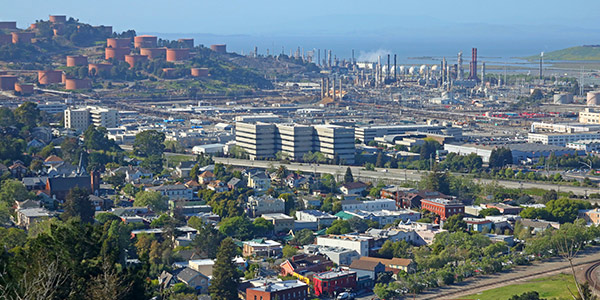Two San Francisco Bay Area cities will join a growing list of communities in California with building electrification ordinances, following the California Energy Commission’s approval Wednesday.
The CEC unanimously accepted ordinances passed by the city councils of Richmond and Hayward, Calif. The new rules needed commission approval because they exceed the efficiency requirements of the state’s 2019 energy code.
Richmond’s ordinance requires new residential buildings to be mainly electric with gas allowed for cooking and fireplaces. It requires new high-rise buildings, both residential and nonresidential, to be all-electric.
In Hayward, new low-rise housing must be all-electric.
“The city of Hayward was one of the first California cities to adopt a climate action plan in 2009, and sustainability remains a top priority,” the city’s mayor, Barbara Halliday, told the commissioners. The city, popular with Silicon Valley workers, is expected to add 2,000 housing units in the next ten years, she said.
There are now 25 cities with CEC-approved electrification ordinances, according to commission staff, including San Jose, Santa Rosa and Berkeley. Some require types of new construction to be fully electrified while others have less-stringent rules. The city of Los Altos Hills, for example, requires new homes to have electric space and water heating.
The CEC and the California Public Utilities Commission have prioritized the switch to electric appliances, including heat-pump water heaters and HVAC units, and away from methane-emitting gas appliances. The state legislature devoted $200 million to jump-start the electrification effort in 2018, with grants administered by the CEC. (See California Travels down Electrification Road.)
On Wednesday, the CEC awarded more than $4.3 million in grants to the Association for Energy Affordability, a group that advocates for energy efficient buildings. The grants were for two programs to advance “next-generation heating, cooling and water heating systems,” including a pilot project to install central heat-pump water-heating systems in apartment buildings in low-income communities.
The CEC also awarded more than $8 million in grants to lower greenhouse gas emissions from healthcare facilities and large commercial buildings. The awards to five entities included nearly $1.5 million to Southern California Gas Co. (SoCalGas) to demonstrate “an emerging and replicable gas heat pump technology that can reduce natural gas consumption for hot water heating by at least 35% in large commercial buildings.”




